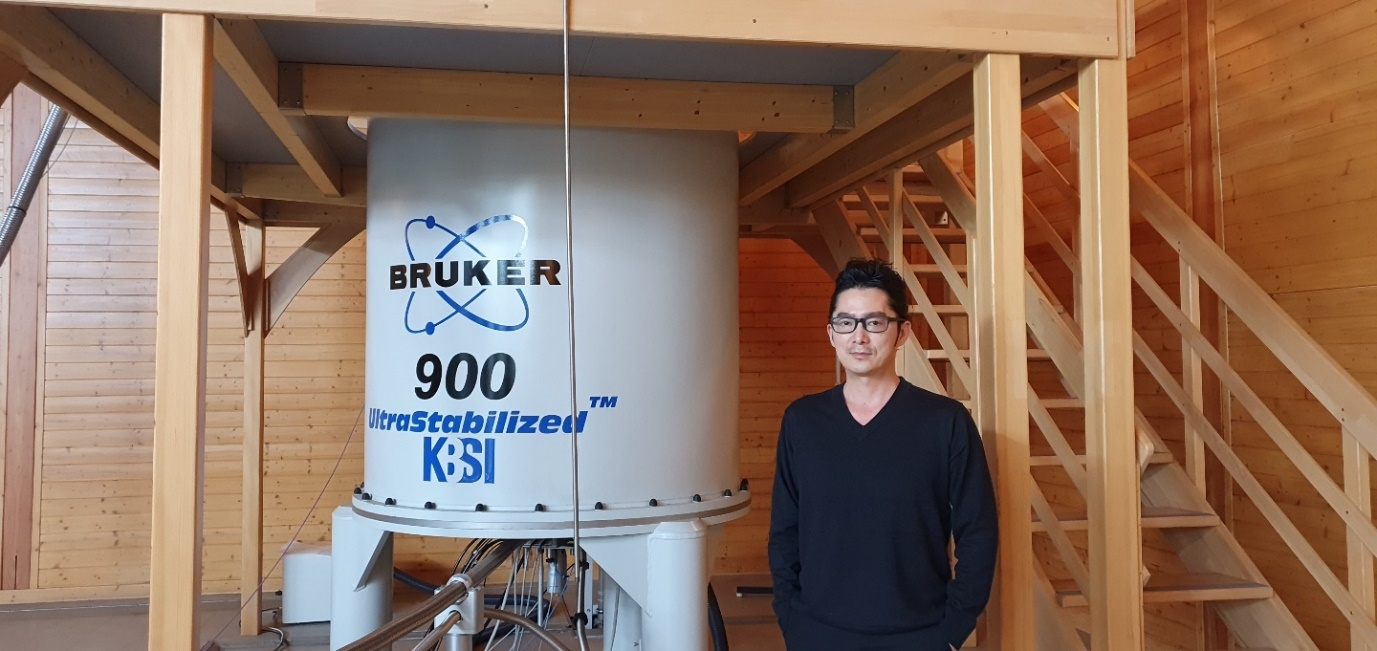
Dr. Young-Ho Lee, Research Center for Bioconvergence Analysis, Korea Basic Science Institute (KBSI) / Bio-Analytical Science, University of Science and Technology (UST) / Laboratory of Protein Science and Diseases, Graduate School of Analytical Science and Technology (GRAST), Chungnam National University (CNU)
“Have faith in your abilities, work hard, and there is nothing you cannot accomplish.”
Dr. Young-Ho Lee attained his PhD in Science from the Graduate School of Science, Osaka University in 2008. Since then, he has been actively contributing to scientific societies in Japan and South Korea and now leads multiple research groups at research institutes and universities in his country, including the nationally renowned Research Center for Research Center for Bioconvergence Analysis, the University of Science and Technology (UST), and Chungnam National University (CNU). He recently organized a Research Convergence Cluster with the support of the National Research Council of Science & Technology (NST) as director in August 2022.
Fascinated by proteins, the main players for living organisms
“When I was pursuing my undergraduate degree in my country, I started to have a strong interest in biomolecules, specifically proteins. Then, I decided to go abroad for my postgraduate study to pursue research on proteins at the molecular level and established myself at the Institute for Protein Research (IPR), Osaka University, a world-class institute for protein science,” says Dr. Lee looking back to his original point as a scientist. During his doctoral studies, he endeavored to investigate various characteristics of proteins, including their (mis-)folding, structure, function, flexibility, stability, and aggregation. As he pursued his studies, Dr. Lee realized more and more that proteins are truly the main players for all types of living organisms. “During all of my 17 years at Osaka University as a student, JSPS fellow, and Assistant/Associate Professor, I immersed myself in the study of proteins, which gave me a lot of satisfaction and pleasure,” he mentions with appreciation for his fortunate situation. “I had an unforgettable time there full of happy memories. I learned everything necessary for doing science during my life at the Institute of Protein Research (IPR). Everyone at IPR always helped and encouraged me. Thanks to all these experiences and efforts, I was able to establish my lab and environment for conducting protein science in South Korea. My research background and skills I acquired in Osaka have formed a strong foundation to collaborate with other research groups, educate students, and foster researchers,” he continues.

A life dedicated to academia, contributing to all lives on earth
Dr. Lee has focused largely on cultivating his career in research, education, and the management of various instruments at KBSI, UST, and CNU. “After moving to South Korea, the emphasis of my research has predominantly been on proteins responsible for diverse disorders including degenerative and infectious diseases, as well as cancer. Along these lines, meaningful outcomes relevant to the etiology of dementia, diabetes, COVID-19, and cancer as well as communications between incurable diseases have been increasingly obtained.” Explaining the critical contributions of his research to our health, Dr. Lee states, “These scientific results will contribute to translational studies such as drug discovery for clinical trials, beyond basic scientific research.” He also adds, “There must be a balance between humans and animals on earth. I would also like to study different diseases that affect animals and create molecules for cures and therapy for them as well.”
In addition to research, he has performed basic and advanced lectures for students to foster their understanding of protein science with an analytical perspective by emphasizing why protein science is so important and what protein science is. Dr. Lee expresses his joy in educating the next generation, saying, “It’s rewarding whenever students begin to show an interest in proteins and improve their knowledge of them. I’ll continue my efforts to cultivate human resources with diverse educational programs.”
Bridging South Korea and Japan with an appreciation for IPR for shaping his career as a scientist
Looking back on his life at the Institute of Protein Research (IPR), Dr. Lee mentions, “There were a lot of foreign students and researchers at IPR, and I could get along well with them for a long time, and still do. This experience has shaped me to think globally, get wider perspectives on science, and realize the importance of networking to conduct more successful research.”
In particular, he expresses his appreciation for his special experiences with NMR management and Protein Data Bank Japan (PDBj), one of the three PDBs in the world, which helped him tremendously to commit and contribute to a national project to install an NMR spectrometer, which as the highest resolution currently available, and a mirror site of PDBj in South Korea, allowing scientific exchanges between Japan and Korea. Dr. Lee expresses his vision, saying, “With admiration for the achievements and contributions by IPR, I will continue my endeavor to establish the Korean version of IPR.”
A message from Dr. Lee to OU
Dr. Lee delivers a message to those who wish to work globally: “Having an open mind to truly understand and accept different culture will allow you to feel comfortable and blend well with people from other countries.” He also shares the words given by his father when Dr. Lee left for Japan in 2002 and his favorite adages that encourage him, “Keep your face always toward the sunshine - and shadows will fall behind you” and “Believe in yourself, and the rest will fall into place. Have faith in your abilities, work hard, and there is nothing you cannot accomplish. Why not! You can also become a leader and pioneer!” He also adds, “Many former and present colleagues, friends, and students have visited me. Please contact me when you come to South Korea!”
Text: Saori Obayashi/Edit: Christopher Bubb